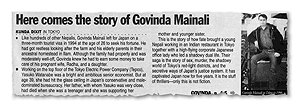 After we reported the plight of Govinda Mainali who is serving a life sentence in a Tokyo jail on a rape-murder charge ("Here comes the story of Govinda Mainali," #39), the judge who sentenced him has himself been accused of having illegal sex with a minor and disbarred.
After we reported the plight of Govinda Mainali who is serving a life sentence in a Tokyo jail on a rape-murder charge ("Here comes the story of Govinda Mainali," #39), the judge who sentenced him has himself been accused of having illegal sex with a minor and disbarred. Japanese and international activists have been campaigning with the Japanese government and the Supreme Court, which is expected to rule on an appeal to send Govinda back to Nepal. They are convinced Govinda is innocent and have formed the "Justice for Govinda" pressure group, which some Nepalis in America have also joined. The activists paid for Govinda's wife Radha to fly to Tokyo to see him in his jail cell last month. This was the first time in eight years that he has seen her.
"I don't know what I'll say, but I may cry when I see him," Radha told reporters through an interpreter before walking into the Tokyo Detention House. Believing in her husband's innocence, Radha finally made the trip to Japan from Jhapa to encourage him and to call for public support.
Govinda, 35, went to Japan in 1993 to seek his fortune, and was working in an Indian restaurant. He was arrested in Tokyo in 1997 on suspicion of murdering an executive in a Japanese energy utility who worked in a high-profile job by day and was a sex worker by night in Tokyo's Shibuya red-light district.
Radha and Govinda did not discuss the case much during the 20-minute meeting. Govinda spent most of the half-hour asking about family especially about his daughters Mithila and Elisa. The younger Elisa was born after Govinda left for Japan and he has never seen her.
Also present in the visiting room separated by a glass partition was a lawyer and a jail guard. The lawyer said Govinda looked more composed than usual, apparently in an effort not to worry his wife. When she said she would be able to stay in Tokyo for only a few weeks, however, Govinda pressed her to stay longer. Radha was in tears when she came out of the detention house.
Govinda was arrested in March 1997 on suspicion of murdering the woman in a vacant apartment in Shibuya Ward and stealing about 40,000 yen ($3,000). The apartment was near the condominium where he lived at the time. The case attracted extraordinary public attention in Japan because of the double life of the victim. Govinda, who has never admitted his involvement in the crime, was acquitted by the Tokyo District Court in April 2000 .
Nevertheless, the Tokyo High Court decided to keep him in detention after prosecutors appealed the case, instead of allowing immigration authorities to deport him over an invalid visa. The high court then reversed the lower court ruling and sentenced him to a life term in December 2000. Despite the lack of new evidence, the high court turned down the earlier ruling that said there was "room for counter-argument" on every aspect of the version of events given by prosecutors .
Radha is convinced of her husband's innocence. "My husband is a gentle and quiet person and would never be able to kill anyone," she told Japan Times. "Knowing everything about him as his wife, all I can say is he did not do it." Radha is worried that their daughters are bullied at school by children who call their father a murderer. When she left her home for the visit to Tokyo, the daughters told her to "bring daddy
home," she said.
Ramesh Amatya, president of the Nepalese Americas Council, who was also in Tokyo at the time says 50,000 Nepalis in the United States are fully backing Govinda. "Anyone who studied this case comes away with the conviction that justice has failed," he said. Back home in Nepal, however, the Govinda issue has still not been raised either by the government (which depends heavily on Japanese development aid) or by activists.


